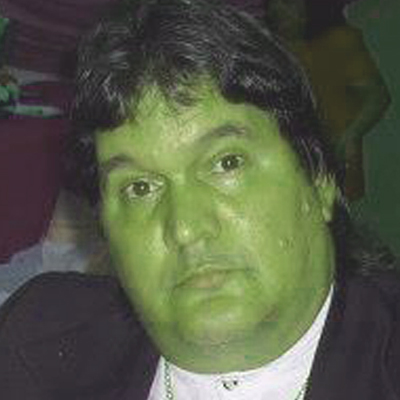Este amigo humorista surgió en Cuba después de mi grupo La Seña del Humor de Matanzas. Lamentablemente, no lo conozco en persona. Pero nos contactamos por correo electrónico y redes sociales, él desde Ecuador, donde reside y yo en Chile.
Su trabajo es muy bueno, profesional, fresco y para carcajearse sin dudas. Es comediante, es imitador, es parodista y supo adaptarse al humor de Sudamérica, después de formarse en Cuba.
Este vis a vis lo realizamos en 2015.
PP: Amigo mío, ante todo: ¿te gusta que te hagan entrevistas?
CEBALLOS: De hecho creo que es la primera vez que me hacen una. Las otras han sido de la oficoda, de la policía, de trabajo o de alguna suegra y esas no me gustaron mucho.
PP: Veo que empezaste con chistecitos. Me gusta eso. Ahora dime, ¿cómo ves el estado del humor en Ecuador, en televisión, radio, teatro, literatura y gráfica este año?
CEBALLOS: En estado de coma.
PP: ¡Wow! Chistocito y al duro. Mejor que mejor. Sigo. En muchos países de América Latina se dice: "Mi país es un pueblo de humoristas", "en mi país, tú mueves una piedra y sale un humorista", etc. ¿Donde vives se dice lo mismo?
CEBALLOS: Aquí en Ecuador tu mueves una piedra y sale un ladrón, un mariguanero, un carterista, un corrupto, un oportunista, un machista, un cornudo, pero humorista, no salen mucho. O no se acercan a las piedras, a no ser que se las tiren.
PP: Correcto, pero te la puse fácil con la frase “mueves una piedra y sale un humorista", ¿eh? Bueno, me estás dando un panorama bien triste del humor en Ecuador. No dudo de tu palabra, pero quiero hacer una aclaración. Sé que dominas más el campo de la TV, el teatro y la radio, pero yo sí conozco que hay buenísimos humoristas gráficos, como mi amigo Bonil, por ejemplo. Además de Guevara, Alfredo García y otros estelares colegas. Lo que pasa es que yo estoy más cerca de ese mundo. Bueno, pero vamos a teorizar un poco: para ti, ¿es verdad la acuñada frase: "Es más fácil hacer llorar que hacer reír?
CEBALLOS: Yo creo que eso depende de la idiosincracia. En Cuba por ejemplo, hacer reír no es difícil, porque el cubano es jaranero, jodedor, alegre, de chiste fácil. Pero fuera de Cuba, sobre todo cuando no conoces bien las costumbres, es difícil. Al principio aquí me las vi negras.
PP: ¿Tenías tiempo para vértelas en esos tiempos? Cuando yo vine a Chile a vivir, no era fácil vérmela, te lo juro. (¿Viste? Me la pusiste fácil con la frase “me las vi negra”). Bueno, en cuanto a la teoría, creo que ese concepto del cubano jaranero, jodedor y alegre, da más para la burla, el choteo (como decía Mañach), pero en cuanto al humor con nivel artístico, ¿será así como dices? Es para reflexionar. ¿Sabes? Un respetado humorista literario, Miguel de Marcos, afirmó que el cubano era así de jodedor y alegre, porque realmente era triste en el fondo y usaba esas formas para ocultar su verdadera esencia. Insisto, es para analizar más y mejor. Una pregunta, ¿cuándo decidiste hacerte humorista?
CEBALLOS: Cuando vi a Virulo y el Conjunto Nacional de Espectáculo y luego cuando vi a tu Seña del Humor de Matanzas, creo que esos fueron los detonantes que influyeron para que una gran parte de los humoristas de mi tiempo, se dedicaran al humor. Claro que verme esta jeta en el espejo también influyó, porque comprendí que con esta cara, no se podía hacer otra cosa.
PP: Bueno, si dices que eres un descarado, no te podías ver en el espejo, ¿no? (estoy mal con los chistecitos hoy). Oye y gracias por lo que me toca al confesar que te estimulamos a dedicarte al humor. Me honra. Y dime ahora, en tu opinión, ¿el humorista nace o se hace?
CEBALLOS: Bueno creo que primero tiene que nacer, porque no conozco de ningún aborto que se haya hecho humorista, luego tienes que tener un don, gracia, vis cómica, y claro, cultivar ese don, estudiar, actualizarte, escribir, crear, buscar tu estilo y sobre todo conocer tus limitaciones.
PP: De nuevo agradéceme por ponerte en bandeja el hacer un chiste con mi frase “¿el humorista nace?”. Estoy de acuerdo contigo, pero, ¿contaste con la alternativa de que el “humorista se hace”; es decir, se hace el humorista y no lo es en realidad. Te lo dejo ahí como tarea para la casa... Ahora sobre ti: ¿cuál ha sido el mejor y el peor momento de tu carrera hasta el día de hoy?
CEBALLOS: Esta sí está difícil. Han sido muchos los buenos momentos, premios en festivales del humor, el de la canción de la contrata en el primer Festival de la Canción Humorística, o el del Aquelarre con la parodia “Venga tía Esperanza” , o la primera vez que hice de Tres Patines en México. Y peores momentos cuando me caí en el foso del Teatro Sauto con Metales h2, haciendo de ciego, o cuando estaba trabajando en el cabaret Las Piñas en Ciego de Ávila y en el momento que salí a actuar, se armó una bronca tumultuaria y las botellas y las sillas de hierro volaban por todas partes.
PP: Para tu consuelo, he visto a varios colegas caerse en el foso del Teatro Sauto de mi ciudad natal. Pero me alegro que tengas más momentos buenos que malos. Confiésate ahora, como profesional del humor, ¿te ríes fácil? ¿Con qué tipo de chistes?
CEBALLOS: Me cuesta mucho trabajo reírme, pero me gusta el humor absurdo, como el de Leslie Nielsen en "¿Dónde está el piloto?" o "¿Dónde está el policía?, Cantinflas, Tres Patines, Chaflán, Charlie Chaplin, Les Luthiers, Alberto Olmedo, Mr. Bean, y también me gusta el humor negro fino y la sátira.
PP: Oye, pero te gustan muchos tipos de humor. Eso es excelente. Y sin dudas, tienes buen gusto. Pero, “para alegrar un poco el ambiente”, ¿me puedes contar alguna anécdota relacionada con tu profesión?
CEBALLOS: Bueno, aquí a veces hago espectáculos imitando a José Feliciano, cantando con músicos en vivo, y todavía me asombro de ver cómo la gente se cree que yo soy el de verdad. Se tiran fotos conmigo, parados al lado mío. En la ciudad de Cuenca hace un año, el dueño nos pidió que no fuéramos a decir que yo no era Feliciano, porque lo iban a linchar, y tuve que hacer de ciego toda la noche.
PP: Ja, ja, buenísimo. Ya te imagino cantando “Feliz Navidad” en pleno verano. Oye, y hablando de artistas, ¿con cuáles colegas te identificas?
CEBALLOS: Yo creo que con todos. He visto varias generaciones de humoristas, he trabajado con Lengua Viva, Mulé, Barry Tatica, Onondivepa, La piña del humor, con Octavio Rodríguez, (Churrisco), Nos y Otros, Los Trifónicos, Fonomemecos, Cuchilla, Oveja negra, Hepáticos, luego surgieron La tiña del humor, Jorge Díaz, Otto Ortiz, Pagola la paga, Punto y coma, Baudilio Espinoza, Andy, El cabo Pantera, Luis Silva, y muchos más. Cada uno con su estilo y su gracia. Creo que hay una cantera inagotable de humoristas en Cuba, que llevan muy adentro las raíces del teatro bufo, de Leopoldo Fernández, Carlos Pous, Candita Quintana, Enrique Arredondo, Álvarez Guedes y luego Virulo, Carlos Ruiz de la Tejera y tu grupo La Seña del Humor, que marcaron un rumbo diferente, un nuevo estilo, una forma distinta de hacer humor, pero me identifico con el estilo de cada uno de ellos.
PP: Gracias por mencionarnos de nuevo. Y para cerrar: ¿qué me aconsejarías a mí como humorista?
CEBALLOS: Que independientemente de que estés haciendo otras cosas, escribiendo libros, dando talleres, conferencias y haciendo páginas maravillosas como ésta, te aconsejo que sigas haciendo presentaciones, porque la Seña del Humor es un símbolo para muchos de nosotros, un referente, y no hay muchos archivos o videos, para verlos. Creo que hay que pensar en algo, para que La Seña vuelva a estar en escena nuevamente. Todos los humoristas lo vamos a agradecer.
PP: ¿Qué te puedo decir, amigo mío? Me emocionan tus generosas palabras. Te confieso que la Seña fue para mí una escuela, ahí me formé como humorista, tanto como comediante, guionista, como director artístico y de actores. Es inolvidable para mí esa etapa de mi vida. Pero también te confieso que me ha hecho feliz también, además del humor escénico, musical y audiovisual que hacía en el grupo, poder hacer humor literario (sobre todo para niños), humor gráfico, y estudiar la teoría del humor y su aplicación en la vida. Me hace feliz haber ampliado mi carrera en el humor y haberla internacionalizado.
Ojalá que algún día se reúna La Seña de nuevo para recordar esa belle epoque del humor cubano.
Te agradezco enormemente tu tiempo y esfuerzo por compartir conmigo este vis a vis y te deseo mucha suerte, salud y éxitos. Un abrazo grande, amigo mío.
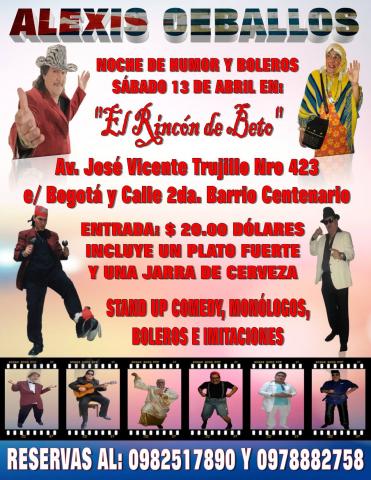
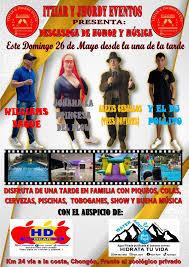
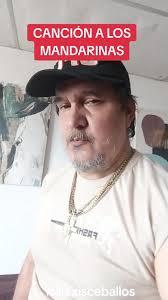
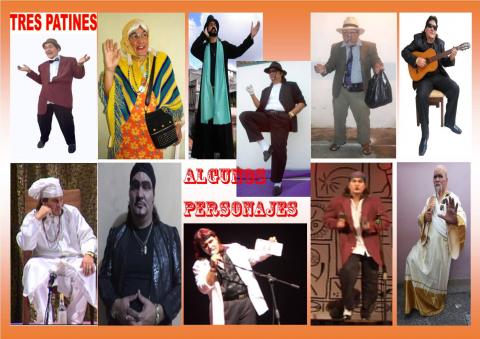
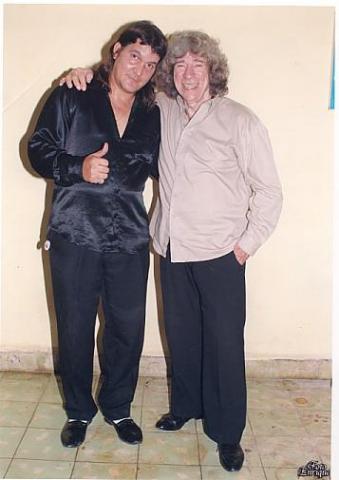
Interview with Alexis Ceballos
By Pepe Pelayo
This comedian friend emerged in Cuba after my group, La Seña del Humor de Matanzas. Unfortunately, I don’t know him in person. But we’ve connected through email and social media—him from Ecuador, where he resides, and me from Chile.
His work is excellent: professional, fresh, and undoubtedly laugh-out-loud funny. He is a comedian, an impersonator, a parodist, and he successfully adapted to South American humor after honing his craft in Cuba.
This vis a vis took place in 2015.
PP: My friend, first of all, do you like being interviewed?
CEBALLOS: Actually, I think this is the first time I’ve been interviewed. The others were from the ration office, the police, for work, or from some mother-in-law, and I didn’t like those very much.
PP: I see you’ve started with little jokes. I like that. Now tell me, how do you see the state of humor in Ecuador—on TV, radio, theater, literature, and graphic arts this year?
CEBALLOS: In a coma.
PP: Wow! Witty and straightforward—just how I like it. Let’s keep going. In many Latin American countries, people say things like, “My country is a land of comedians,” or, “In my country, if you turn over a rock, a comedian pops out,” and so on. Is it the same where you live?
CEBALLOS: Here in Ecuador, if you turn over a rock, you’ll find a thief, a pothead, a pickpocket, a corrupt person, an opportunist, a misogynist, or a cuckold—but comedians? Not so much. Or maybe they don’t go near the rocks unless someone’s throwing them.
PP: Fair enough, but I made it easy for you with the phrase, “If you turn over a rock, a comedian pops out,” didn’t I? Well, you’re painting a pretty sad picture of humor in Ecuador. I don’t doubt your word, but I’d like to clarify something. I know you’re more familiar with TV, theater, and radio, but I do know there are some amazing graphic humorists, like my friend Bonil, for example. Not to mention Guevara, Alfredo García, and other stellar colleagues. I’m just closer to that world. But let’s theorize a bit: Do you think the phrase, “It’s easier to make people cry than to make them laugh,” holds true?
CEBALLOS: I think it depends on the culture. In Cuba, for example, making people laugh isn’t hard because Cubans are playful, witty, cheerful, and quick with a joke. But outside of Cuba, especially when you don’t know the customs well, it’s tough. At first, it was really challenging for me here.
PP: Did you even have time to face challenges back then? When I moved to Chile, it wasn’t easy either, I swear. (See? You made it easy for me with the phrase, “It was really challenging for me.”) Anyway, regarding theory, I think the concept of the playful, witty, and cheerful Cuban lends itself more to mockery and choteo (as Mañach would say). But when it comes to humor with artistic depth, do you think it’s the same? It’s worth reflecting on. You know, a respected literary humorist, Miguel de Marcos, once said Cubans are so cheerful and playful because they’re actually sad deep down and use those forms to hide their true essence. Again, it’s worth analyzing further. One question: When did you decide to become a comedian?
CEBALLOS: When I saw Virulo and the Conjunto Nacional de Espectáculos, and later, your Seña del Humor de Matanzas. I think those were the triggers that inspired many comedians of my time to dedicate themselves to humor. Of course, looking at this face in the mirror also had an influence—I realized with this face, I couldn’t do anything else.
PP: Well, if you say you’re shameless, you couldn’t have looked in the mirror, right? (I’m not doing well with my jokes today.) Hey, thanks for admitting we inspired you to pursue humor. I’m honored. Now, tell me: In your opinion, is a comedian born or made?
CEBALLOS: Well, I think they have to be born first because I don’t know of any abortions that became comedians. Then, you need to have a gift, grace, a comedic vein—and of course, cultivate that gift: study, stay updated, write, create, find your style, and above all, know your limitations.
PP: Once again, thank me for handing you a joke on a silver platter with my phrase, “Is a comedian born?” I agree with you, but did you consider the possibility of “a comedian being made”—as in, someone pretends to be a comedian but isn’t really one? I’ll leave that as homework for you. Now, about yourself: What has been the best and worst moment of your career so far?
CEBALLOS: That’s a tough one. There have been so many good moments: awards at humor festivals, winning the Contrata Song award at the first Humoristic Song Festival, or the Aquelarre Festival with the parody “Venga Tía Esperanza,” or the first time I played Tres Patines in Mexico. As for the worst moments, falling into the orchestra pit at the Sauto Theater with Metales H2 while playing a blind character—or when I was performing at Las Piñas Cabaret in Ciego de Ávila, and as soon as I got on stage, a massive brawl broke out, with bottles and iron chairs flying everywhere.
PP: For your comfort, I’ve seen several colleagues fall into the pit at the Sauto Theater in my hometown. But I’m glad you’ve had more good moments than bad ones. Now confess: As a humor professional, do you laugh easily? What kind of jokes make you laugh?
CEBALLOS: It’s hard for me to laugh, but I like absurd humor, like Leslie Nielsen’s in Airplane! or The Naked Gun, Cantinflas, Tres Patines, Chaflán, Charlie Chaplin, Les Luthiers, Alberto Olmedo, Mr. Bean, and I also enjoy refined dark humor and satire.
PP: Wow, you like many types of humor! That’s great. And without a doubt, you have good taste. But “to lighten the mood,” can you share a funny anecdote related to your profession?
CEBALLOS: Well, sometimes I perform shows imitating José Feliciano, singing with live musicians, and I’m still amazed at how people believe I’m him. They take pictures with me, standing right next to me. In Cuenca last year, the owner asked us not to tell people I wasn’t really Feliciano because they’d lynch him. So, I had to pretend to be blind all night.
PP: Ha! That’s fantastic. I can already imagine you singing “Feliz Navidad” in the middle of summer. Speaking of artists, which colleagues do you identify with?
CEBALLOS: I think with all of them. I’ve seen several generations of comedians, worked with Lengua Viva, Mulé, Barry Tatica, Onondivepa, La Piña del Humor, Octavio Rodríguez (Churrisco), Nos y Otros, Los Trifónicos, Fonomemecos, Cuchilla, Oveja Negra, Hepáticos, and later, La Tiña del Humor, Jorge Díaz, Otto Ortiz, Pagola la Paga, Punto y Coma, Baudilio Espinoza, Andy, El Cabo Pantera, Luis Silva, and many more. Each one has their style and grace. I think there’s an endless pool of comedians in Cuba who carry the roots of teatro bufo, from Leopoldo Fernández, Carlos Pous, Candita Quintana, Enrique Arredondo, Álvarez Guedes, to Virulo, Carlos Ruiz de la Tejera, and your group, La Seña del Humor, which charted a different course—a new style and way of doing humor. But I identify with each one’s style.
PP: Thanks for mentioning us again. And to wrap up: What advice would you give me as a comedian?
CEBALLOS: Even if you’re doing other things—writing books, giving workshops, lectures, or creating wonderful pages like this one—I advise you to keep performing. La Seña del Humor is a symbol for many of us, a reference, and there aren’t many archives or videos of it. Something needs to be done to bring La Seña back to the stage. All of us comedians would be grateful.
PP: What can I say, my friend? Your generous words move me. I’ll admit that La Seña was a school for me. It’s where I developed as a comedian, scriptwriter, and artistic director. That stage of my life is unforgettable. But I also confess that I’ve been happy expanding my career into literary humor (especially for children), graphic humor, and studying the theory of humor and its application in life. It makes me happy to have broadened my career in humor and taken it internationally.
I hope La Seña can reunite someday to relive that belle époque of Cuban humor.
I deeply appreciate your time and effort in sharing this vis a vis with me, and I wish you much luck, health, and success. A big hug, my friend.
(This text has been translated into English by Google Translate)

